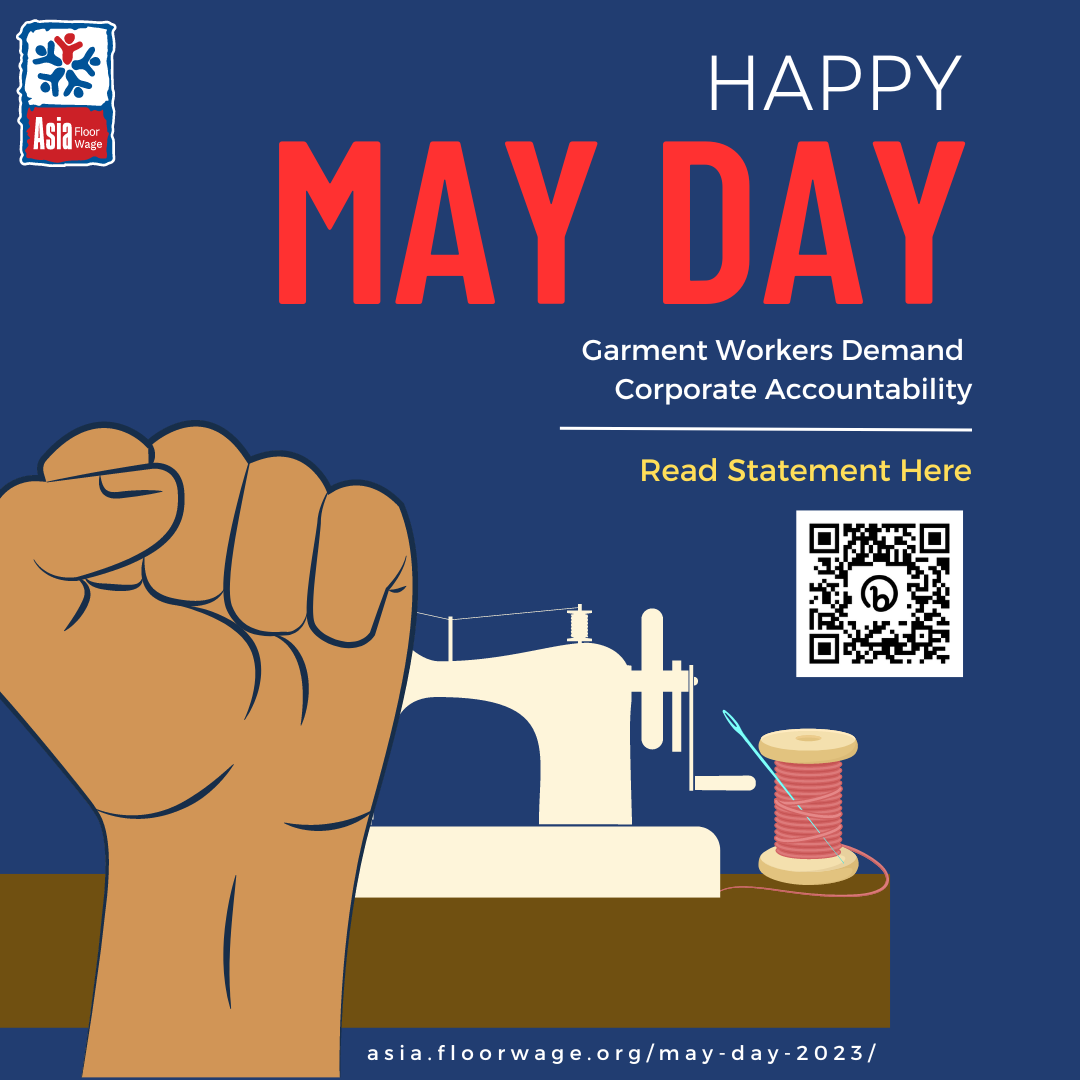May Day 2023: Garment Workers Demand Corporate Accountability | Asia Floor Wage Alliance
Read in Bahasa Indonesia | ខ្មែរ | Tiếng Việt | বাংলা | ಕನ್ನಡ | සිංහල
May Day greetings to all!
The first of May is not just a day to celebrate the struggles and strides made by workers. It is also a day to highlight the urgent need to correct the unfair, unilateral and oppressive practices of fashion companies that drive the global garment supply chain and deny garment workers decent work conditions and a dignified life.
This May Day, we recognize the collective demand of Asian garment workers and their unions for brand accountability in the global fashion supply chain. Asia Floor Wage Alliance (AFWA) reaffirms our commitment to continue to fight for living wages, gender justice and supply chain regulation for the well-being of garment workers in Asia.
Hold brands accountable for human rights violations in supply chains
Brands’ opaque purchasing practices and refusal to address human rights violations in their supply chains have exposed the unequal distribution of power in the fashion industry.
To cite just one example, it has been three years since the Covid-19 pandemic, and millions of Asian garment workers — who are majorly women — producing for Big Fashion companies, have still not been paid the wages that they were owed after major fashion brands canceled or drastically reduced orders en masse.
While several factors contribute to this lopsided distribution of power, the most pertinent is the poverty-level wages that workers receive, restricting them from speaking out against any injustice for fear of losing their jobs. Apparel brands have not only ignored their role in the downward spiral in wage standards in production countries, but they have also manipulated these vulnerabilities to make their sourcing decisions even more mercenary and harmful to workers’ lives.

By committing wage theft on even the poverty-level wages workers receive, brands are directly responsible for the extreme humanitarian crisis workers are experiencing. We will continue to take legal action against brands in workers’ home countries and initiate dialogue through the OECD framework against brands who refuse to take responsibility for the massive wage theft they perpetrated against garment workers in their supply chains.
Brands must close the gap between living wage and minimum wage
Trade unions and labor organizations note the key role of national governments in implementing fair labor laws and sufficient minimum wages for the ready-made garment (RMG) sector. Garment workers in countries like Bangladesh, Cambodia, India, Indonesia, Pakistan and Sri Lanka, continue to demand a justifiable and legitimate increase in minimum wages that take into account current costs of living. But in a garment supply chain with fashion brands’ threat of relocation, even production country governments have limited power.
Brands, instead of pushing wages down further through their mercenary sourcing practices, must ensure basic human rights by closing the gap between the poverty-level minimum wages and a living wage. Brands must support trade unions’ demand for a fair minimum wage in production countries and adjust their purchasing practices to contribute towards a living wage in their supply chains. This contribution would constitute a small percentage of fashion companies’ massive profits. Such a contribution would prevent workers from sinking into poverty in the next economic crisis. Close the gap! Wage Forward to realize a living wage for garment workers!
Brands must support worker-led initiatives to eradicate GBVH
Over 80% of garment workers are women and ending gender-based violence and harassment (GBVH) on the factory floor is a priority. AFWA upholds the importance of worker- and union-led initiatives in preventing and remediating GBVH, and puts forth enforceable binding agreements with worker unions as the solution to eradicating violence at the workplace.
The Dindigul Agreement to End Gender-Based Violence and Harassment is one such example where signatory brands commit to labor and allies to use their supply chain relationships to support a worker- or union-led program at certain factories or worksites. We urge more Big Fashion brands to sign such enforceable binding agreements and ensure better compliance with international human rights conventions, thereby improving workers’ retention rates, productivity and trust in the workplace.
More power to trade unions
A key component of such agreements is the inviolable right of workers to collectivize and develop bargaining power, so as to democratize the global supply chain. This is a central condition to assert and negotiate other rights. In a post-Covid world, where the garment industry is still reeling from the impact of poverty-level wages, poor health and levels of nutrition, and high rates of GBVH, trade unions are needed more than ever to give voice to workers’ concerns.
This May Day, we reaffirm workers’ right to form labor unions and collectively bargain for better working conditions, gender justice and living wages. It’s not enough for brands to pay lip service to decent work and better wages. We need binding and enforceable brand commitments with unions that represent garment workers.
Let us stand together in solidarity and demand justice for all workers. The fight for fair wages and decent working conditions continues, and we will not rest until workers receive the respect and dignity they deserve. The future of work is at stake, and we demand that brands take their responsibility seriously.
